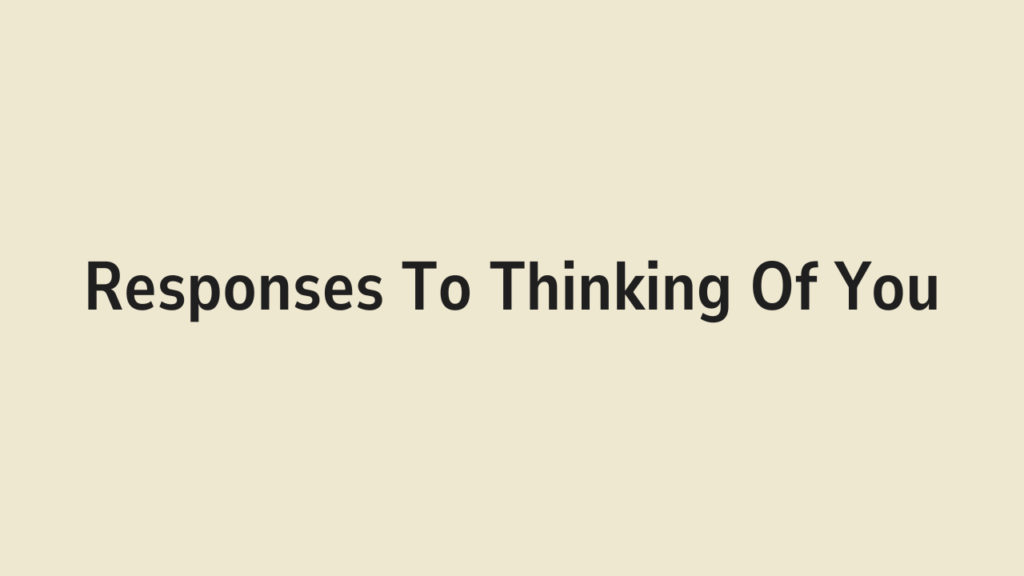When someone says “I’m thinking of you,” it can have a variety of meanings, depending on the context and the relationship between you and the person. Whether it’s a friend, family member, or romantic partner, hearing that someone is thinking of you can be a heartwarming experience. However, it can also leave you unsure about how to respond, especially if you’re not sure what the person means or how you feel about them.
In this blog post, we’ll explore the many ways you can respond to the phrase “thinking of you.” We’ll cover different scenarios, provide examples, and give you tips on how to express gratitude, care, or even deflect the sentiment, depending on the situation. We’ll also provide a table with sample responses to help guide your reactions.
What Does “Thinking of You” Really Mean?
Before we dive into how to respond, it’s important to first understand the potential meanings behind the phrase “thinking of you.” Depending on the context, it could have different implications:
- Affectionate or Romantic Sentiment:
- A romantic partner may say “thinking of you” to express affection or longing.
- This can be a sweet gesture, letting you know that you are on their mind.
- Friendly or Supportive Gesture:
- A close friend or family member might say “thinking of you” as a way to show that they care, especially during tough times or when they haven’t seen you in a while.
- It’s a reminder that they are there for you, even if they are far away.
- Casual or Polite Statement:
- Sometimes, “thinking of you” might be used in a more casual way, with no deep emotional significance. It could be a friendly gesture or just a way to check in.
- Sympathy or Empathy:
- When someone is aware that you are going through a difficult situation (e.g., the loss of a loved one, a stressful event), they might say “thinking of you” as a way to express sympathy and offer emotional support.
- Nostalgic or Reflective:
- In some cases, “thinking of you” might be an expression of nostalgia, especially if it comes from someone you haven’t seen in a long time, like an old friend or an ex.
By understanding the context in which the phrase is said, you’ll be better prepared to respond in a thoughtful way.
Why Responding Matters
How you respond to “thinking of you” can help strengthen your relationship with the person, whether it’s a friend, family member, or romantic partner. Your response may set the tone for the conversation and show the other person that you care or appreciate their thoughtfulness. A thoughtful response can also:
- Deepen your connection with the person.
- Show empathy and support in difficult times.
- Maintain or enhance friendships through mutual care and respect.
- Strengthen romantic relationships by expressing affection and appreciation.
Now that we know why responses matter, let’s explore different ways to respond.
Types of Responses to “Thinking of You”
Your response will depend on your relationship with the person and the context in which they said “thinking of you.” Here are different categories of responses based on the scenario:
1. Expressing Appreciation or Gratitude
If someone is expressing care, affection, or support by saying “thinking of you,” a positive and heartfelt response is a great way to show your gratitude.
- For a Romantic Partner:
- “That’s so sweet of you. I’m thinking of you too.”
- “You just made my day. I miss you!”
- “I love knowing you’re thinking of me.”
- “You’re always on my mind as well!”
- For a Friend or Family Member:
- “Thank you! I’m thinking of you too!”
- “That means a lot to me. I hope you’re doing well!”
- “It’s nice to know you’re thinking of me. I miss you!”
- “That’s so thoughtful, thank you for checking in.”
- For Someone Going Through a Difficult Time:
- “Thank you for thinking of me. It really means a lot.”
- “I appreciate your support. It’s a tough time, but hearing from you helps.”
- “That’s so sweet. Your kind words are a comfort to me.”
These responses help build a deeper emotional connection and show the person that their gesture has been recognized and appreciated.
2. Reciprocating the Sentiment
If you also want to express that you’re thinking of the person, reciprocating the sentiment can strengthen the bond. This is especially important in romantic relationships, but it can work for friends and family too.
- For a Romantic Partner:
- “I’ve been thinking about you all day, can’t wait to see you!”
- “I miss you so much, hope we can talk soon.”
- “Every time you say that, my heart skips a beat.”
- For a Friend or Family Member:
- “I was just thinking of you too! Let’s catch up soon.”
- “I’m glad you’re thinking of me. I’ve been thinking of you too!”
- “You’re always in my thoughts, my friend.”
- For Someone Going Through a Tough Time:
- “I’m thinking of you too and hoping things get better.”
- “You’re in my thoughts, and I’m here for you anytime.”
- “I know it’s a hard time, but you’re not alone. I’m always here for you.”
Reciprocating the sentiment shows you care and helps create a mutual exchange of positive feelings.
3. Responding with Humor
If the context is more lighthearted, such as between friends or close family members, you can respond with humor to keep things casual and fun. This can also help ease any tension if you’re feeling awkward.
- Examples:
- “You’re thinking of me? I must be pretty awesome!”
- “Well, I’m glad someone is. I’ve been busy trying to find my keys all day.”
- “Thinking of me, huh? I hope it’s all good stuff!”
- “I was just thinking of you too, but mostly about how I still owe you lunch!”
Humor can make the exchange more fun, and it can also help ease awkwardness if the phrase is said in a casual context.
4. Acknowledging the Thought in a Neutral Way
Sometimes, a more neutral response is the best way to respond, especially if you don’t feel particularly close to the person or don’t know how to reciprocate. A simple acknowledgment can keep the conversation polite and respectful.
- Examples:
- “Thanks for thinking of me!”
- “I appreciate that. Hope all is well with you too.”
- “It’s nice to hear from you, hope everything’s going great on your end.”
- “That’s kind of you, thank you.”
This is a good way to acknowledge the sentiment without diving too deep into emotions, which is useful in more casual or professional contexts.
5. Responding with a Thoughtful Gesture
If someone says “thinking of you,” you might want to follow up with a more meaningful gesture, such as suggesting a phone call, offering help, or planning a meet-up.
- For a Romantic Partner:
- “Let’s have a call later tonight—I miss hearing your voice.”
- “How about we plan a weekend together soon? I can’t wait to see you.”
- For a Friend or Family Member:
- “Let’s catch up soon! How about we grab coffee this weekend?”
- “Let me know if you need anything, I’m always here for you.”
- For Someone Going Through a Tough Time:
- “If you ever need someone to talk to, I’m here for you. Don’t hesitate to reach out.”
- “Would you like to meet up soon? I think some time together might help.”
These types of responses show your care through actions rather than just words.
Table: Sample Responses to “Thinking of You”
| Scenario | Response Example |
|---|---|
| Romantic Partner | “I’ve been thinking about you too! Can’t wait to see you.” |
| Friend or Family Member | “Thank you! I’ve been thinking of you too. Let’s catch up soon.” |
| Someone Going Through a Tough Time | “Your support means so much to me. Thank you for thinking of me.” |
| Humorous Response | “You’re thinking of me? I must be pretty awesome!” |
| Neutral Response | “Thanks for thinking of me! Hope everything’s good with you.” |
| Thoughtful Gesture | “Let’s catch up this weekend. I’d love to hear how you’re doing.” |
Conclusion: Responding to “Thinking of You” with Care and Confidence
Whether someone is offering you a thoughtful gesture, expressing affection, or just checking in, how you respond to “thinking of you” can help strengthen your relationship. There are no wrong answers, but understanding the context of the conversation and your relationship with the person will guide your response.
Whether you choose to express appreciation, reciprocate the sentiment, respond with humor, or acknowledge the thought in a neutral way, it’s important to let the other person know that you value their care and support. Your response will show that you’re present, thoughtful, and invested in the relationship,



